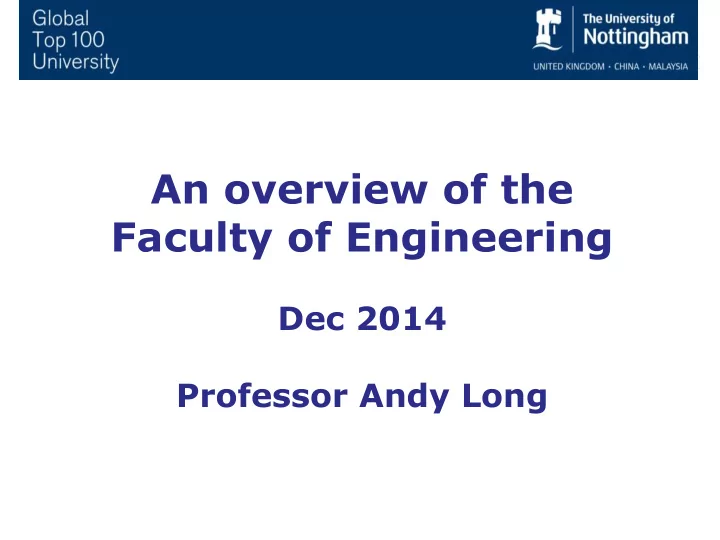

An overview of the Faculty of Engineering Dec 2014 Professor Andy Long
University of Nottingham University College Nottingham was awarded a Royal Charter in 1948 – establishing the University of Nottingham Since then we have seen extensive growth & development – we now have 43 800 students & 8400 staff, working & studying at 6 campuses in 3 countries Always highly regarded – a UK top 10 and global top 100 University* * QS World University Rankings
University of Nottingham Significant Global University • Top 1% of worldwide universities • Over £112m research income 2012/13 • 57% of research income linked to industry • 7 th in UK for research power 43,765 high calibre students • 33,369 students in the UK, • 9,564 post graduate • China campus – 5,848 • Malaysia – 5,548 Major employer and regional citizen • Over 8400 staff (1200 in overseas campuses) • Over £560m turnover • 6 Campuses – 4 in Nottingham, 1 in China, 1 in Malaysia
The University of Nottingham Faculty of Faculty of Faculty of Social Faculty of Faculty of Arts Medicine & Engineering Science Sciences Health Sciences
Faculty of Engineering Engineering at Nottingham • ~3,300 undergraduate and 1,100 postgraduate students in UK • Around 700 staff FTE in the UK, including ~230 academics and ~250 research staff • Many world-class Research Groups, Centres and Institutes; lead University priorities of Aerospace, Energy and Manufacturing • Turnover of ~£80M, total research portfolio of ~ £125 million • Top 5 in RAE 2008; most Departments ranked in the top 10 in the UK in recent league tables
Faculty of Engineering Engineering, Malaysia Campus (from 2000) – Full range of Undergraduate courses – 100 staff and >2000 students, 120+ PhD research students – Excellent progress with research growth – 246 papers published in 2 years to 2011 – 3.3 million RM research contracts awarded in 2011 Engineering, China, Ningbo campus (from 2005) – Full range of Undergraduate courses – Over 60 staff and >1000 students (2013) – Large recent research awards, including International Doctoral Innovation Centre with 100 places from 2012 in Energy and Digital Economy Research
Faculty Strategy Our vision is to be recognised as a top 5 UK Engineering Faculty for teaching, research and knowledge transfer, and a world leader in transnational higher education in engineering. We will achieve this via our: • Global Reach – a network of international campuses • Talented people – working and learning in a vibrant and supportive academic community • Commitment to inspirational teaching • Outstanding environment and facilities • World class centres delivering fundamental and applied research for tomorrow’s technologies
Faculty Strategy Our vision is to be recognised as a top 5 UK Engineering Faculty … FTEs GPA 4* 3* 2* 1* 5/85 based on University of Cambridge 210.0 3.32 42.1 47.9 10.0 0.0 Research quality (next University of Oxford 122.7 3.07 25.0 58.5 15.0 1.5 Imperial College London 293.1 3.04 28.1 50.1 19.1 2.7 ranking will be in Dec University of Manchester 180.2 2.96 22.2 53.3 23.2 1.4 2014) University of Nottingham 114.5 2.95 22.1 53.6 21.3 3.0 Bangor University 8.0 2.95 30.0 40.0 25.0 5.0 University of Surrey 110.3 2.93 23.9 48.1 25.0 3.0 University of Leeds 132.7 2.91 20.0 54.3 22.5 3.2 University of Bristol 88.1 2.88 18.5 56.1 20.4 5.0 University of Warwick 69.5 2.85 20.0 50.0 25.0 5.0 7 th based on Research and Teaching in 2014 (world top 75)
Strategic Aims Research Teaching & Learning • Be recognised in UK top 5 for • Enhance our market position & research & knowledge transfer recruit students of the highest possible quality • Increase research income & margins • Review & revise our portfolio to • Achieve research profile at Asia exploit benefits of integrated Faculty campuses in key areas comparable structure with that of UK • Enhance the student experience • Expand number, breadth and effectiveness of research & • Maximise graduate employment knowledge transfer partnerships/ opportunities collaborations Global Reach • Work in partnership with international campuses • Support the international student experience • Encourage and support staff mobility • Recruit high quality international students • Develop and maintain prestigious international partnerships
Faculty Structure Faculty Executive Dean, 3 Associate Deans, Faculty Manager, UNMC & UNNC Deans Teaching and Learning Research Divisions Departments Mechanical, Materials and Manufacturing Chemical and Environmental Architecture and Built Environment Foundation Engineering & Physical Sciences Electrical and Electronic Civil Electrical Systems and Optics Energy and Sustainability Infrastructure, Geomatics and Architecture Manufacturing and Process Technologies Materials, Mechanics and Structures
UG and PG Courses • Undergraduate Courses (3,300 students) – Foundation year (for students who do not have correct qualifications) – 3 years to Bachelor of Engineering (BEng) – 4 years to Master of Engineering (MEng) – Bachelor of Architecture (BArch) and Master of Architecture (MArch) • Postgraduate Courses – 1 Year Masters to MSc ( 500 students on 50+ courses) – 3 Years Research to PhD ( 600 students) – 4 Years Research to EngD (PhD with time in industry)
PGR Study • PhD Degrees – Architecture – Building Technology – Chemical Engineering – Civil Engineering – Electrical & Electronic Engineering – Engineering Surveying – Environmental Engineering – Human Factors – Manufacturing Engineering – Materials Engineering – Mechanical Engineering • Applied to: – Energy, Transport, Sustainable Construction, Healthcare, Digital Economy, Aerospace, Sustainable Processing
Thank you
Recommend
More recommend